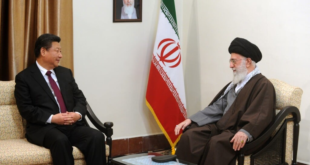China’s military may be examining its decades-old space program for ways to improve data collection and disrupt the satellites of other countries if needed, analysts said this week following a Mars landing and a debris crash into the Indian Ocean.
Earlier this month China placed a rover on Mars, the official Xinhua News Agency reported, becoming the second nation after the United States to make the landing. A little more than two years ago, China sent its robotic spacecraft Chang’e 4 to a basin on the far side of the moon. A Chinese orbital space biology lab is due for completion by 2025, the Beijing-based Global Times news website said in March.
Along with its achievements, China’s fast-growing space program has caused some alarm. Earlier this month, there was real concern about possible casualties as debris from one of its rockets fell to earth, landing in the Indian Ocean west of the Maldives and south of India.
Although none of China’s space missions has an express military motive, analysts believe the People’s Liberation Army is monitoring this ever-deeper exploration for opportunities, such as new ways to collect intelligence or blind satellites from other countries during any conflict.
“Now that they have a very modern launch vehicle fleet, they want to probe as much as they can, and if there’s something that’s attractive for industry or for military purposes, then they’ll proceed,” said Marco Cáceres, director of space studies with the market analysis firm Teal Group Corp. in the United States.
Decades of space exploration
China launched its first satellite in 1970 and put its first man in space in 2003, becoming the world’s third nation, after Russia and the United States, to do so. Chinese officials have said they are using space exploration peacefully and have spoken at the U.N. Conference on Disarmament against the militarization of earth’s outer atmosphere.
Some of its scores of satellites are for military or dual-purpose use, the SpaceRef industry news website says. Western countries believe two in particular to be for express military use, it says.
The U.S. Department of Defense has said in reports on the Chinese armed forces that the manned space launch could help China militarily and that the country may be developing a direct-ascent anti-satellite weapon to jam U.S. navigation satellite signals.
‘Dazzle’ and gather data
The Chinese military could be looking for ways now to use direct energy beams to “dazzle” or disrupt other countries’ gear operating in low orbits, said Derek Grossman, senior analyst with the U.S.-based Rand Corp. research organization.
Its satellites might eventually gather information in a way that protects that data from “adversarial interference”, he added.
To target a foreign satellite would mean “mutually assured destruction,” said Carl Thayer, an Asia-specialized emeritus professor from the University of New South Wales in Australia.
China is not capable of militarizing the moon or Mars, said Alexander Huang, a strategic studies professor at Taiwan’s Tamkang University in Taiwan.
Showing strength on earth
But missions to the far reaches of space let China flex muscle on earth, Thayer said.
“The larger [agenda] is demonstrating technological prowess, advanced technology to convince the rest of the world ‘you’re on a losing wicket if you’re going to stick to the U.S.’, that China’s growing more and more powerful,” Thayer said. Many smaller Asian governments consider Washington to be a military ally as China’s navy becomes stronger in the region.
China’s space program is catching up to the United States, currently the world’s top space power in terms of resources, Grossman said. Few other countries have programs that come even close. “Their space program is second in the world,” he said. “They are catching up to us rapidly and will probably overtake us if we don’t invest in the coming years.”
China is anxious to compete especially so it can impress its own citizens around events such as the 100-year anniversary this year of the Communist Party’s founding, Huang said. It’s looking at space for scientific knowledge too, he said.
“China needs one or two leading programs that can give more No. 1 stickers to China when they celebrate the centennial and continue to celebrate whatsoever,” Huang said.
Steady progress, no agenda
China still lacks a specific “agenda” save to expand its presence in space as other countries do, Caceres said. But all along, he said, China’s military will have the “biggest role” of any government department, even in multi-use endeavors.
The country with the world’s third strongest armed forces after the United States and Russia is exploring space in a “methodical” way, without the shifts that the U.S. space agency, NASA, experiences when new presidents take office in Washingtonton, he said.
But overall, he said, “they’re just kind of seeing what’s possible.”
 Eurasia Press & News
Eurasia Press & News



